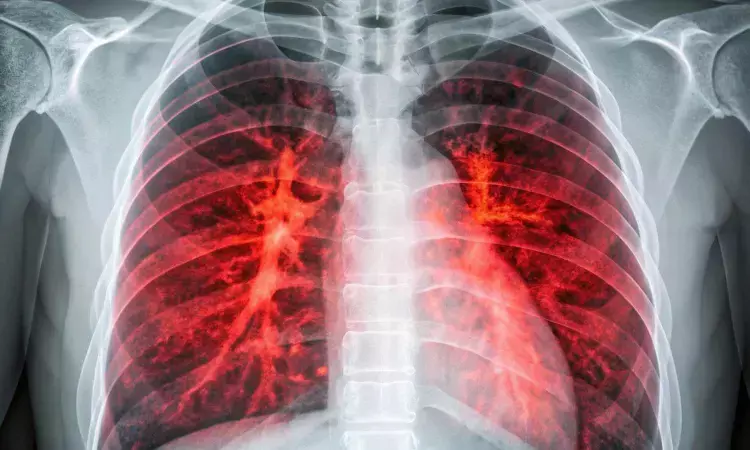- Home
- Medical news & Guidelines
- Anesthesiology
- Cardiology and CTVS
- Critical Care
- Dentistry
- Dermatology
- Diabetes and Endocrinology
- ENT
- Gastroenterology
- Medicine
- Nephrology
- Neurology
- Obstretics-Gynaecology
- Oncology
- Ophthalmology
- Orthopaedics
- Pediatrics-Neonatology
- Psychiatry
- Pulmonology
- Radiology
- Surgery
- Urology
- Laboratory Medicine
- Diet
- Nursing
- Paramedical
- Physiotherapy
- Health news
- Fact Check
- Bone Health Fact Check
- Brain Health Fact Check
- Cancer Related Fact Check
- Child Care Fact Check
- Dental and oral health fact check
- Diabetes and metabolic health fact check
- Diet and Nutrition Fact Check
- Eye and ENT Care Fact Check
- Fitness fact check
- Gut health fact check
- Heart health fact check
- Kidney health fact check
- Medical education fact check
- Men's health fact check
- Respiratory fact check
- Skin and hair care fact check
- Vaccine and Immunization fact check
- Women's health fact check
- AYUSH
- State News
- Andaman and Nicobar Islands
- Andhra Pradesh
- Arunachal Pradesh
- Assam
- Bihar
- Chandigarh
- Chattisgarh
- Dadra and Nagar Haveli
- Daman and Diu
- Delhi
- Goa
- Gujarat
- Haryana
- Himachal Pradesh
- Jammu & Kashmir
- Jharkhand
- Karnataka
- Kerala
- Ladakh
- Lakshadweep
- Madhya Pradesh
- Maharashtra
- Manipur
- Meghalaya
- Mizoram
- Nagaland
- Odisha
- Puducherry
- Punjab
- Rajasthan
- Sikkim
- Tamil Nadu
- Telangana
- Tripura
- Uttar Pradesh
- Uttrakhand
- West Bengal
- Medical Education
- Industry
Inflammation may be responsible for driving earliest stages of lung cancer, suggests research

By creating high-resolution cellular and molecular visual maps of lung cancer before and during development, researchers at The University of Texas MD Anderson Cancer Center have discovered that the earliest stages of lung cancer may be driven by inflammation, suggesting that targeting proinflammatory pathways could be an early intervention approach.
The study, published today in Cancer Cell, generated spatial transcriptomic maps in precancerous and more advanced stages of lung cancer to provide a deeper understanding of early lung cancer development. The research was led by Humam Kadara, Ph.D., professor of Translational Molecular Pathology, and Linghua Wang, M.D., Ph.D., professor of Genomic Medicine, associate member of the James P. Allison Institute™ and focus area co-lead with the Institute for Data Science in Oncology.
“We find that the earliest cells that give rise to lung cancer are in regions with very high inflammation and are surrounded by proinflammatory cells. Targeting inflammation by neutralizing a driver called IL-1B reduces these precursor cells of lung cancer,” Kadara said. “Our work paves the way for targeting inflammation to intercept the earliest stages of lung cancer and impact patient lives.”
What is spatial transcriptomics and how does it help identify targets for cancer progression?
Spatial transcriptomic maps provide a visual representation of where and how genes are expressed within samples. Characterizing the cells and genes in precursor lesions – early-stage growths or changes in tissues that have the potential to develop into cancer – can identify potential targets for early intervention.
The researchers generated spatial transcriptomic maps of 56 human precursor lesions and advanced lung cancer samples from 25 patients. They validated their findings using an independent cohort of 36 lesions from 19 patients, providing 486,519 spots and 5.4 million cells for analysis.
How do these findings help patients with lung cancer?
The researchers were able to highlight certain molecular and inflammatory changes and characteristics that can distinguish between precursor cells and advanced lung cancer.
For instance, there are proinflammatory areas within precursor lesions that have alveolar cells associated with tumors. These proinflammatory regions also are more active and more prevalent in earlier phases of lung cancer development, and are conserved in lab models of lung cancer, suggesting that inflammation in these regions is likely initiating tumors.
The findings show that targeting inflammation alone or in combination with immunotherapy may be promising early interception strategies for lung cancer.
Reference: Fuduan Peng, Ansam Sinjab, Yibo Dai, Warapen Treekitkarnmongkol, Sujuan Yang, Lorena I. Gomez Bolanos, Tieling Zhou, Minyue Chen, Alejandra G. Serrano, Avantika Krishna, Nastaran Karimi, Manvi Sharma, Akshay Basi, Guangsheng Pei, Jianlong Liao, Yunhe Liu, Jiping Feng, Zahraa Rahal, Yang Liu, Jiahui Jiang, Kai Yu, Tala Noun, Yuejiang Liu, Khaja Khan, Kyung Serk Cho, Jichao Chen, Luisa M. Solis, Sarah Mazzilli, Steven Dubinett, Tina Cascone, Avrum E. Spira, Stephen Swisher, Naoe Jimbo, Takuo Hayashi, Satsuki Kishikawa, Kazuya Takamochi, Tomoo Itoh, Takashi Yao, Kenji Suzuki, Neda Kalhor, Ignacio I. Wistuba, Mingyao Li, Seyed Javad Moghaddam, Junya Fujimoto, Jared Burks, Jeffrey Myers, Kadir Akdemir, Linghua Wang, Humam Kadara, Inflammation may be responsible for driving earliest stages of lung cancer, University of Texas M. D. Anderson Cancer Center, Journal: Cancer Cell
Dr Kamal Kant Kohli-MBBS, DTCD- a chest specialist with more than 30 years of practice and a flair for writing clinical articles, Dr Kamal Kant Kohli joined Medical Dialogues as a Chief Editor of Medical News. Besides writing articles, as an editor, he proofreads and verifies all the medical content published on Medical Dialogues including those coming from journals, studies,medical conferences,guidelines etc. Email: drkohli@medicaldialogues.in. Contact no. 011-43720751


